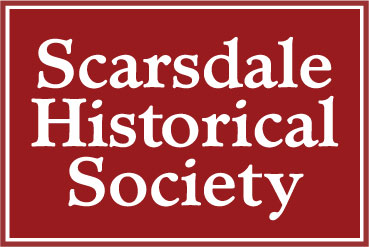19th Century School Board Notebooks Discovered and Digitized
/The Scarsdale Historical Society, in partnership with the Scarsdale Public Schools and Scarsdale Public Library, has re-discovered and digitized a collection of school board minute books dating as far back as the 1860s. The books are providing valuable material for the Historical Society’s upcoming documentary on the history of the Scarsdale schools, set to premiere in December.
The existence of the notebooks was referenced in old articles and books from 50 years ago, but neither the Historical Society nor the Scarsdale Public Library knew of their current whereabouts. One of the earliest members of the school board, Judge William Mercer, originally donated them to the district in 1925. He was a member of the board for 25 years, and the chair for 20 of those years.
An article from 1925 referencing the long-unseen record books. Judge Mercer, one of the earliest school trustees, gifted them to the Board of Education 100 years ago.
On a hunt to find them, the Historical Society reached out to Honoré Adams, District Clerk and Executive Assistant to the Superintendent, who ultimately found them in district storage with the help of District’s Records Retention and Disposition Officer, Annabelle Allamby.
Honoré Adams, District Clerk, Executive Assistant to the Superintendent, and hero behind the rediscovery of the minute books.
There are 7 notebooks from the years 1868-1928, largely handwritten. They offer a rare glimpse into the district’s earliest days — a time of oil lamps, tight budgets, and even the occasional stray farm animal wandering onto the grounds. Together, the books trace the humble origins of a district that would grow into one of the nation’s most respected.
The earliest school board minute book, dating back to 1867.
Now fully digitized, transcribed, and searchable online, the minute books are accessible to the public through the library’s Digital Collection on the New York Heritage website. “We are privileged to host these historic files and make them accessible to the public,” stated Elizabeth Bermel, Director of Scarsdale Public Library. The digitization project was funded by a grant provided by the Historical Society, with all three organizations collaborating closely to preserve the fragile originals.
"This project is exactly in keeping with our mission to preserve and share Scarsdale’s history," said Randy Guggenheimer, President of the Scarsdale Historical Society. "We are grateful to collaborate with the Scarsdale Public Schools and Scarsdale Library, continuing the village’s long tradition of community-minded spirit and collective effort."
“Our students can learn so much from this initiative,” said Drew Patrick, Superintendent of Scarsdale Public Schools. “It’s a real-life lesson on the power of primary sources, and how history is best understood through the records of those who lived it.”
To access to the digitized books, visit click here.
.











